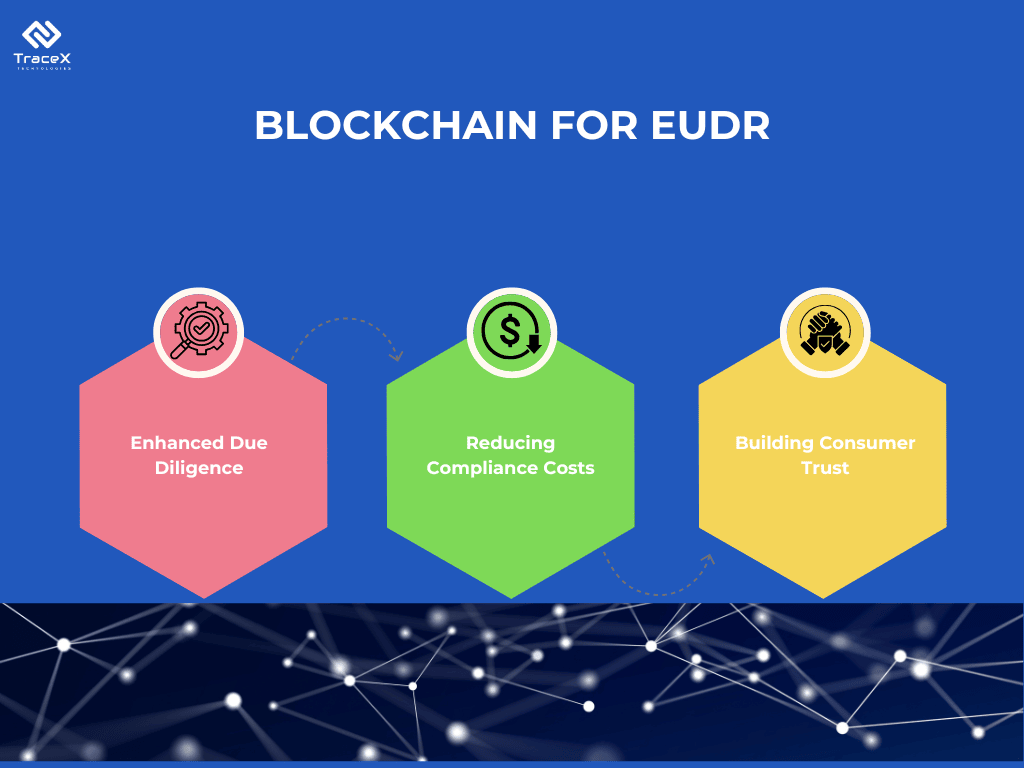Contact: +91 99725 24322 |
Menu
Menu
Quick summary: Explore how blockchain technology can enhance supply chain transparency for EUDR compliance, helping businesses meet regulations while promoting sustainability.

Meeting the EU Deforestation Regulation (EUDR) requirements can be daunting for businesses, as it involves proving that their products are deforestation-free. The key challenge lies in ensuring transparent and traceable supply chains, especially when dealing with multiple suppliers and regions. This is where blockchain for EUDR comes into play. Blockchain’s secure, immutable ledger can track every step of a product’s journey, ensuring data integrity and making compliance reporting easier, turning a complex regulatory task into a streamlined solution.
Key Takeaways
The European Union Deforestation Regulation (EUDR) is aimed at curbing global deforestation by controlling the entry of certain commodities like soy, palm oil, cocoa, coffee, and beef into the EU market. Businesses exporting these commodities to the EU are required to demonstrate that their products are not associated with deforestation, ensuring their supply chains are transparent and sustainable.
For businesses, compliance with EUDR can be a complex task, especially when ensuring accurate traceability and verification of supply chain practices. Technologies like blockchain can assist in meeting these requirements, making the process more transparent and manageable.
Blockchain, a decentralized and transparent technology, offers a powerful solution for overcoming the complexities of EUDR compliance.
Blockchain provides an open, tamper-proof ledger where every transaction along the supply chain is recorded. From the moment a commodity is sourced to its final destination, every step is traceable. This level of transparency allows companies to prove that their products comply with EUDR requirements.
Blockchain ensures that once data is entered, it cannot be altered. This immutability is crucial for proving compliance with EUDR because it provides an unchangeable record of all transactions. If a company claims its products are deforestation-free, blockchain provides the evidence to back it up.
Blockchain allows real-time tracking of goods as they move through the supply chain. Companies can monitor their shipments and verify that their suppliers are adhering to environmental regulations, all in real-time. This helps prevent any breaches of EUDR rules and ensures immediate action if an issue arises.
Blockchain’s unique characteristics make it an ideal tool for EUDR compliance. These features include decentralization, traceability, and smart contracts, all of which contribute to greater accountability and transparency.
One of blockchain’s core strengths is decentralization. Unlike traditional systems that rely on a central authority to validate transactions, blockchain operates on a peer-to-peer network. This decentralized nature enhances trust because no single entity controls the system, making the data more reliable.
Blockchain allows for the complete traceability of goods. Every step in the supply chain is recorded, from the origin of raw materials to the final product. This traceability is critical for EUDR, as businesses must prove that their goods are sourced from deforestation-free areas.
Smart contracts are self-executing contracts with the terms directly written into code. For EUDR compliance, smart contracts can automatically verify that all supply chain participants are meeting regulatory requirements. This reduces the need for manual checks and ensures that businesses stay compliant.
Certain industries are particularly impacted by EUDR, and blockchain technology can help these sectors achieve compliance more easily.
In agriculture, blockchain ensures that crops like soy, palm oil, and rubber are sourced from deforestation-free areas. Forest products such as timber can also be tracked to ensure compliance with EUDR standards.
The rubber and palm oil industries are under immense scrutiny due to their significant impact on deforestation. Blockchain can provide the necessary transparency and traceability to ensure that these commodities meet EUDR guidelines.
Coffee and cocoa are complex supply chains with numerous intermediaries. Blockchain simplifies the process by providing a single source of truth, ensuring that all players in the supply chain are adhering to EUDR regulations.

The TraceX EUDR Compliance platform uses blockchain technology to help businesses comply with the European Union Deforestation Regulation (EUDR) by ensuring transparency and accountability in their supply chains. The platform enables real-time tracking of commodities, from their origin to the final product, ensuring that each step is documented and immutable. This allows businesses to provide verifiable proof that their products are deforestation-free.
1. End-to-End Traceability: The platform tracks every step of a product’s journey, from farm to market. Each stage is recorded on the blockchain, providing a tamper-proof ledger that verifies compliance with EUDR standards.
2. Data Collection and Transparency: Through its user-friendly interface, TraceX helps businesses gather accurate data on land use, crop practices, and supplier operations, ensuring that they align with the regulation’s requirements. It automates data collection and simplifies documentation, making compliance easier.
3. Risk Management: The TraceX platform helps identify and mitigate risks in the supply chain by flagging non-compliant suppliers. This reduces the potential for supply chain disruptions and helps businesses maintain their market access in the EU.
4. Auditable Records: By using blockchain, TraceX enables businesses to produce verifiable, auditable records of their sourcing practices. This is crucial for meeting EUDR’s due diligence requirements and avoiding legal repercussions.
With its blockchain-powered features, TraceX’s platform offers a robust solution for businesses aiming to achieve EUDR compliance, ensuring that their products meet the stringent standards of the European market.
TraceX is assisting a major tire company in ensuring EUDR compliance through the integration of remote sensing technology for risk assessment of sourced raw materials. By enabling geo-location traceability of natural rubber used in manufacturing, the platform helps the company maintain transparency. Additionally, the integration with the EU Information System allows the tire importer to log a ‘Due Diligence Statement’ and obtain a ‘Reference Number,’ streamlining compliance processes effectively.
As regulations like the EUDR become more common, blockchain’s role in ensuring compliance is only set to grow. It offers a way for businesses to adapt quickly and meet regulatory needs with transparency and accuracy. Blockchain’s benefits extend beyond EUDR. Its core strengths—transparency, traceability, and data integrity—make it a natural fit for other environmental and social compliance standards. Whether it’s managing supply chain transparency for sustainability laws or ensuring ethical sourcing, blockchain can support businesses as they navigate a range of requirements.
With new regulations emerging, keeping up can be a challenge. This is where blockchain shines. Its flexibility means it can be adapted for different industries and updated as new compliance needs arise. As rules become more detailed and the need for accountability grows, blockchain technology offers a solid foundation that evolves alongside the regulatory environment. It’s not just a tool for today but a way to future-proof compliance strategies, helping businesses stay competitive and compliant as rules continue to change.
Incorporating blockchain technology into EUDR compliance is more than just a regulatory requirement; it’s a strategic advantage. By enhancing supply chain transparency, businesses can not only meet the stringent demands of the EUDR but also foster trust with consumers and stakeholders. As the regulatory landscape evolves, adopting blockchain solutions positions companies for future success, ensuring sustainable practices while reducing their environmental footprint.
The EU Deforestation Regulation (EUDR) is a law aimed at preventing products linked to deforestation from entering the EU market. It requires businesses to ensure their supply chains are sustainable and traceable.
Blockchain provides a decentralized and tamper-proof ledger that tracks every transaction and movement of goods. This ensures all parties can verify the source and sustainability of products at any point in the supply chain.
Yes! Beyond EUDR, blockchain can be adapted to support various environmental and social compliance requirements, providing a flexible solution for businesses facing evolving regulatory demands.
